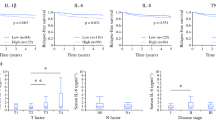Abstract
Due to the low efficiency of immunotherapy for colorectal cancer (CRC), it is extremely promising and relevant to study the mechanisms of immunosuppression. In this work, a comprehensive study of the expression of soluble and tissue forms of PD-1 and PD-L1 in blood serum and tumors of patients with CRC, as well as IDO1 in tumors was performed for the first time. The diagnostic and prognostic significance of the studied parameters was determined. A statistically significant decrease in the number of soluble forms of PD-1 and PD-L1 in the blood serum and the association of the number of PD-L1+ cells in the stroma of tumors with the CRC stage were established. The absence of correlations between soluble and tissue forms of the studied proteins was shown, indicating the presence of independent mechanisms of immunosuppression in CRC, which may explain the ineffectiveness of immunotherapy for this type of tumor.



Similar content being viewed by others
REFERENCES
Keir, M.E., Butte, M.J., Freeman, G.J., et al., PD-1 and its ligands in tolerance and immunity, Annu. Rev. Immunol., 2008, vol. 26, pp. 677–704.
Latchman, Y., Wood, C.R., Chernova, T., et al., PD-L2 is a second ligand for PD-1 and inhibits T cell activation, Nat. Immunol., 2001, vol. 2, no. 3, pp. 261–268.
Sun, C., Mezzadra, R., and Schumacher, T.N., Regulation and function of the PD-L1 checkpoint, Immunity, 2018, vol. 48, no. 3, pp. 434–452.
Platten, M., Wick, W., and Eynde, B.J., Tryptophan catabolism in cancer: beyond ido and tryptophan depletion, Cancer Res., 2012, vol. 72, no. 21, pp. 5435–5440.
Wang, R. and Green, D.R., Metabolic reprogramming and metabolic dependency in T cells, Immunol. Rev., 2012, vol. 249, no. 1, pp. 14–26.
Zhai, L., Ladomersky, E., Lenzen, A., et al., IDO1 in cancer: a Gemini of immune checkpoints, Cell Mol. Immunol., 2018, vol. 15, no. 5, pp. 447–457.
Funding
The study was supported by the Russian Foundation for Basic Research (project no. 20-015-00479).
Author information
Authors and Affiliations
Corresponding author
Ethics declarations
Conflict of interest. The authors declare that they have no conflict of interest.
Statement of compliance with standards of research involving humans as subjects. All procedures performed in a study involving sick and healthy people comply with the ethical standards of the organization’s ethics committee and the 1964 Declaration of Helsinki and its subsequent amendments or comparable ethical standards. Informed voluntary consent was obtained from each of the participants included in the study.
Additional information
Translated by M. Batrukova
Rights and permissions
About this article
Cite this article
Kovaleva, O.V., Rashidova, M.A., Gratchev, A.N. et al. Immunosuppression Factors PD-1, PD-L1, and IDO1 and Colorectal Cancer. Dokl Biochem Biophys 497, 66–70 (2021). https://doi.org/10.1134/S1607672921020095
Received:
Revised:
Accepted:
Published:
Issue Date:
DOI: https://doi.org/10.1134/S1607672921020095




